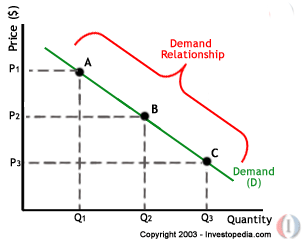
William: That most very basic premise of economics -- the sense of that curve above, the fact that it is sloped 'downhill' from left to right, and not 'uphill' (and that supply would have the opposite sense and not only a different slope, but a different sense to that slope -- 'uphill' -- is -exactly- what Krugman got away with -inverting- in his widely touted liquidity trap paper. In it, he voodoo'd an uncalibrated model, the result of which is the claim that in -aggregate- (not for a specific industry or commodity, mind you, but for 'the economy as a whole' -- both supply and demand have the same sense (or 'slope') and only differ in the magnitudes of their slope. In his paper, he labels that curve 'Topsey Turvey Economics' because indeed, it is complete nonsense. Yet, the sense of both of those slopes being the same sign was -critical- to the conclusions he made in that paper, and it was those -conclusions- that he toured the Husting with, beating folks over the head with. He used it to come up with a self serving political explanation of 'liquidity trap' as well as a self serving political conclusion: lowering business taxes would contract 'the economy' and raising business taxes would expand 'the economy.' Realize, he wasn't just asserting one of the extremes, like 'a flat slope' (purely inelastic or purely elastic), but a slope that had actually inverted. And he claimed this not for a single odd commodity over some narrow range of prices (like 'the cadillac effect', where some theorize, demand might increase with price because there is 'value' purely in the magnitiude of the price paid for something, like conspicuos consumption, 100$ bills as toiler paper)-- but rather, in aggregate for his entire modeled economy. And he claimed -- the very opening paragraph of the paper -- that this model and this gibberish represented present day conditions in something these politico voodoo priests like to refer to as 'the' economy, And he totally got away with it. Nobody questioned the Nobel Prize Winning Princeton Professor (they finally canned him and he's somewhere else hissing his lefty nonsense). The look on his face as he pulled this off said it all; it was his complete and utter contempt for America. In his mind, it deserved to be led around by the nose if it could be this stupid in aggregate. It smacks of an Ivy Leager's idea of a cruel joke. And, here it is:
https://www.princeton.edu/~pkrugman/debt_deleveraging_ge_pk.pdf Look at Fig 1. on p 26. Read his model assumptions: "Imagine a pure endowment economy in which no aggregate saving or investment is possible, but in which individuals can lend to or borrow from each other. Suppose, also, that while individuals all receive the same endowments, they differ in their rates of time preference." .... "a pure consumption model without any investment." Translated: we are all Trust Fund babies who wake up every morning, receive our equal allotment checks in the mail and differ only in our aversion to 'risk' in such an economy as we figure out how to sprint only downhill... What is this 'modeling?' A lost episode of Star Trek? And yet, here is an assertion at the very opening of this paper: "We argue that this approach sheds considerable light both on current economic difficulties and on historical
episodes, including Japan’s lost decade (now in its 18th year) and the Great Depression itself." This paper is the very epitome of what Feynman warned us all about; it is an example of Cargo Cult Science. It has equations. There is math. There are derivatives. And it is not only all and totally not calibrated, but not understood or criticised. It is accepted as proof of some political assertion, borrowing the veneer and look of mathematics, as if tribesmen had stumbled into a crashed Space Shuttle and built a cockpit by copying its appearance from vines and grass and sticks. And all of that is nonsense, smoke and mirrors to glaze over the few who would ever brave a look at it -- exactly the source of Krugman's contempt. He is contemptuous of America's on average inability to read or comprehend his borrowed voodoo math and understand the plain English of his model assumptions. He knows 99% of AMerica will blow by and just concede to the Nobel Prize Winning Aparatchik. And he was totally right. He got away with it. His two cents became a widely publicized part of modern political debate. And it is complete gibberish. Google "krugman minksy liquidity trap" Now consider; how did he get away with this? It is a failure not primarily of Joe SIxpack American just living his life with better things to do, but of an entire field that yet claims itself to be a 'soft science' and a celebraty adulation reward system that makes Voodoo High Priests out of Fellow Travelers. regards, Fred
| 